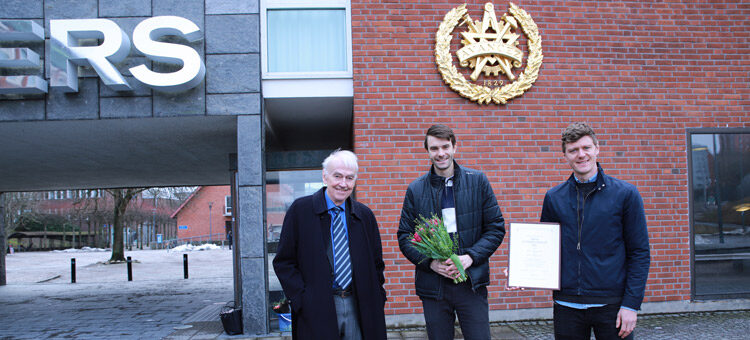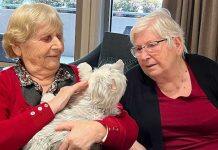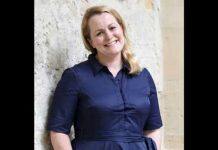

Chalmers students and elite athletes Johan Rogestedt and Johan Högstrand receive an entrepreneurship award for their master’s thesis project that may revolutionize sports technology. Two special prizes have also been handed out for important efforts in combating the spread of covid-19.
Lactate measurement is an increasingly popular method in sports that involves measuring the levels of lactic acid in the blood to optimize your training. Today, this method is both cumbersome and expensive as it requires continuous blood sampling with machine reading. But what if it was possible to obtain the same values with technology that continuously measures the lactate value so that you can adapt your training accordingly?That was the starting point for Johan Rogestedt’s and Johan Högstrand’s thesis project that now receives Bert-Inge Hogsved’s award for best entrepreneurship. Every year, Hogia’s Entrepreneurship Award goes to a technologist or a group of technologists at Chalmers for best entrepreneurship.
“Historically, many exciting ideas have received this award. It feels great to be acknowledged in the same way. Above all, it gives us the motivation to continue with what we have already started”, says Johan Rogestedt, who is an elite runner that recently won the Swedish Championship.
Had sports in common
Johan Rogestedt and elite orienteer Johan Högstrand are National Sports University students at Chalmers. That means that they get increased support from the university to combine their studies with a professional athlete career.
The duo who have an athlete background in common became friends and later thesis partners during their master’s studies in Systems, control, and mechatronics at Chalmers. They both have personal experience of lactate measurements and think there is great commercial potential with their invention. A measurement method based on sensors instead of blood samples could be used in the healthcare industry and by all kinds of people who engage in heart rate training.
“Today, the default is heart rate measurement in, for example, sports watches, but if lactate measurement had been the standard, it would have been possible to obtain better measures of both intensity and fatigue”, says Johan Högstrand.
“With the current method, you cannot stop in the middle of a competition to take a blood sample. If you could have obtained the value in other ways, you would be able to optimize your starting speed and perform better when you compete”, says Johan Rogestedt.
They will continue working on their prototype with Chalmers Innovation Office this summer. The next step is to figure out how to optimize their innovation.
“We will pick up where the thesis ends and continue to work part-time with the project. The goal is to achieve quality in our measurements with the conclusions we drew during the thesis. We only need to fine-tune some electronics until then”, says Johan Högstrand.
“We want to get to the bottom of the issue with lactate measurement and see how far we can go to produce a commercial product in the end”, he adds.
Working with sports tech
In addition to their success of the degree project, Högstrand and Rogestedt will graduate from Chalmers this summer with a bright future in the sports technology industry alongside their sports careers. Johan Rogestedt already works as a software engineer for a sports tech company in Silicon Valley, but is working remotely from Gothenburg.
Johan Högstrand runs his own company after winning the entrepreneurship competition Chalmers ventures startup camp with his bachelor’s thesis on power meters in cross-country skiing.
”There will be a time after our sports careers end as well. It was a given for us to study alongside being athletes. But many pieces of the puzzle need to fit when you try to combine these two things.”, says Högstrand.
“Being part of a Swedish Sports University has made a big difference because our professors at Chalmers understand the challenges we face as athletes and students. It has been easier to adapt our studies and take exams online when we have to travel to compete and attend training camps. That flexibility at Chalmers has made it possible for us to reach our goals and be where we are today.”, says Rogestedt.
Two special awards
This year, Bert-Inge Hogsved’s award for best entrepreneurship also includes two special awards. They are awarded to four Chalmers students who have made important contributions in the work of combating the spread of covid-19 in the spring of 2020, when the shortage of medical devices in healthcare and elderly care was acute.
Carl Strandby and Joel Martinsson Budillon managed to gather a group of students and other volunteers to make 12,000 protective aprons for the healthcare system in only two months.
“There was a huge shortage of protective aprons in Gothenburg when the pandemic struck. So we started to manifacure them ourselves. It was a way for us to turn our worry into something productive. Receiving this award means that others see the value in what we have accomplished. We share the profit with all the volunteers who have been involved in this project”, says Carl Strandby.
Edward Hadziavdic and Marcus Örtenberg Toftås also engaged a large number of students and volunteers. They manufactured visors, among other things, by using the university’s 3D-printer. 15 000 visors were delivered directly to the health service during the initial phase of the pandemic.







































